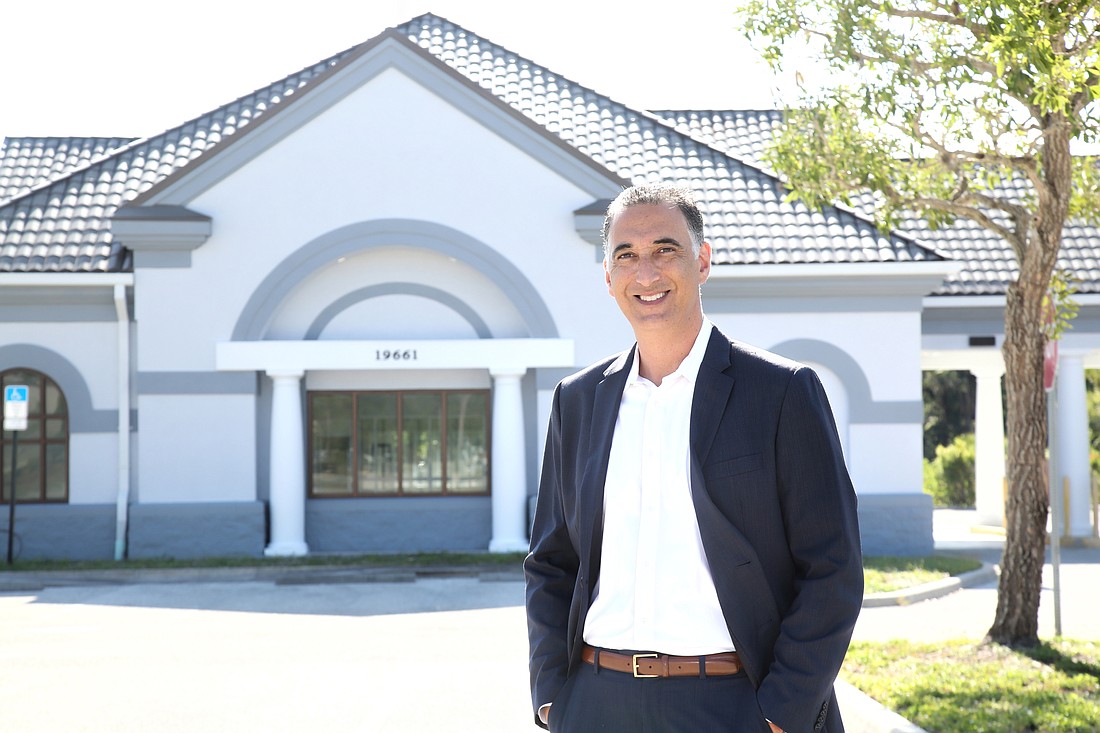The early days of Todd Katz’s now successful banking career were a deviation of sorts from the textbook way of taking the industry by storm.
It was back in 1996. Katz, after a few years overseeing the legal department of a fast-growing group of banks in Naples and Fort Myers, decided to go out on his own. “I was writing all these proxy statements,” recalls Katz, “and I figured why can’t I do this?”
Both to not compete with his former Southwest Florida employer and to hopefully find fertile community banking turf, Katz, along with business partner Lew Albert, chose Charlotte County for their venture. While fertile, it could have also been futile. Katz recalls for a time he was selling stock to the bank out of the trunk of Albert’s Cadillac, going business-to-business in sleepy Port Charlotte. He would go to the UPS guy, who would suggest someone else, who would point Katz in another direction.
Eventually Katz and Albert had enough to open Tarpon Coast National Bank — raising $11 million through a public offering among 1,000 shareholders. The bank was a solid success: Katz oversaw growth to four offices and $160 million in assets. The partners sold Tarpon Coast in 2005 to Urbana, Ill.-based First Busey Bank for $35.6 million, netting shareholders a 17% annualized return for the seven years.
Katz followed Tarpon Coast with Calusa Bank, another success, considering he co-launched that bank months before the economy tanked. In another unorthodox move for the often staid, copycat-like banking industry, Katz, Albert and his board pulled off a major victory with Calusa: the bank survived the recession, then it was acquired by a credit union, Dunedin-based Achieva. The deal was considered the first s of a bank by a credit union nationwide.
Two years after that deal, Katz, 52, is primed for his third go at starting and running a Charlotte County bank. Going back in time, this bank, under a state charter, will be named Tarpon Coast. Katz has already assembled a board and hopes to raise around $15 million for Tarpon Coast 2.0. Stock for the bank is expected to go on sale in June, and Katz hopes to open the bank in November in Port Charlotte.
“Todd has always set the bar high and done what he set out to accomplish,” says Dennis Tolton, a Charlotte County developer and real estate broker who invested in Tarpon Coast one and is board member for the sequel. “He’s always been honest and delivered, and that’s only gotten better over time.”
"We couldn’t say can’t in our house growing up. If you did, you were grounded, you lost TV.” Todd Katz
Post it
Katz, who grew up outside New York City, first came down to Florida for college, when he went to the University of Florida. With a degree in history, Katz stayed in Gainesville for law school at UF, where he specialized in banking law at the Fredric G. Levin College of Law. More than a passion for finance, the move was practical: Katz read a story in the Wall Street Journal during law school that said while the market for new lawyers was drying up, banking law was a niche on the rise.
After law school, Naples banker Gary Tice recruited Katz to work in the legal department at First National Bank of Naples and its parent company, Southwest Banks. A prominent Naples businessman and well-known statewide for his banking success, Tice mentored the young attorney. “He taught me so much about the nuances of customer service,” says Katz.
That was at the forefront of Katz’s mind when he Albert, who worked with Katz at First National Bank of Naples, founded Tarpon Coast. Even so, recalls Katz, “a lot of people thought I was crazy” for leaving a job with Tice that had a lot of upside — not to mention a stable salary.
While aware of the risks, Katz says he didn’t see the move as crazy. “I never said what if,” Katz says. “I could envision that bank so clearly I never imagined not making it.”
That visualization isn’t just idle chatter. Katz traces it back to being a young boy, when, before Post-it-Notes, his father made him write goals down on paper, then stick them to bathroom mirrors.
Katz took the visualization show on the road recently: he went down to Key West for a week, armed with a Whiteboard and some markers for the hotel room. While there he mapped out his vision for the next coming of Tarpon Coast. Katz also took a small Whiteboard with him to Costa Rica two years ago, when, after he sold Calusa, he contemplated his next career step.
Another entrepreneurial nugget Katz learned from his father: the power of can. “We couldn’t say can’t in our house growing up,” says Katz. “If you did, you were grounded, you lost TV.”
Stay home
Katz is headed back to his never say can’t days with the latest version of Tarpon Coast.
While the economy is strong, and banking industry consolidation has left pockets of opportunity for a true locally based bank working with local people, a startup bank is far from a sure thing. That’s why so few are doing it: Only 12 banks nationwide filed de novo (startup) applications between March 2017 and this past March, according to a report from S&P Global Market Intelligence. Three of those are in Florida, including one from Gulfside Bank Sarasota.
Katz says he wasn’t going to get back in banking after Calusa. He dabbled in real estate with a friend for a bit, and was content to find something different.
But the market opportunities, combined with the Trump Administration loosening of strict Obama-era community banking regulations, lured Katz back. A friend in the industry recruited Katz to help start a bank on Florida’s east coast, but, now well-connected in Port Charlotte and Punta Gorda, Katz chose to stay home.
In launching Tarpon Coast, Katz is dipping back into some lessons from Calusa. That bank, even though it sold for less money than the first Tarpon Coast — Achieva paid $23.2 million for Calusa, 1.36 times book value, in 2015 — could be Katz’s biggest banking success. Calusa, for starters, while it had some dents, didn’t get swallowed up by bad loans like many other community banks did to the north, in Sarasota, and south in Fort Myers. “They did more follow up and were more cautious” than other banks, says Tolton, the Tarpon Coast two board member.
Katz says the discipline to say no to potential business when he thinks the loan is too risky, even for a business contact he likes or admires, is a key Calusa lesson. “Lew and I always treated the bank’s money as if it was our money,” Katz says.
Another key Calusa lesson, one Katz has already begun to implement at Tarpon Coast, is the board can’t just be figureheads with checkbooks. They have to be willing to do business at the bank, and spread the bank’s model to their network of contacts.
“The board is a critical ingredient to the recipe of” a successful community bank, says Katz. “Not just in the money, but in what they can do for the bank with others in the community.”
(This story was updated to reflect the timing of when stock will go on sale for Tarpon Coast Bank.)
Take the deep dive into our Top Entrepreneurs series:






